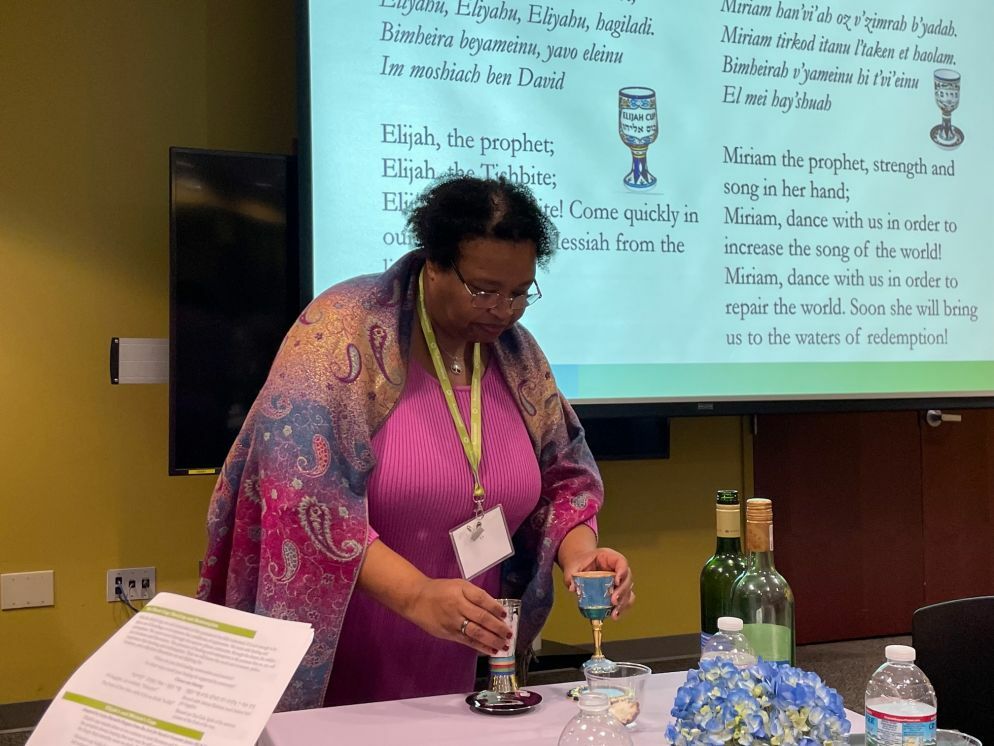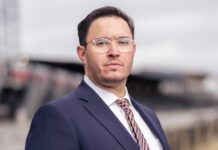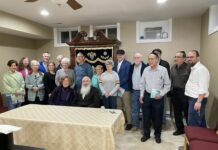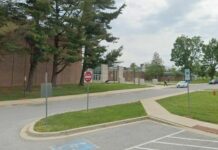
Many people will be holding seders for their families to read the haggadah and enjoy classic holiday dishes. But not everyone is able to celebrate Passover with their family, and some may want a more focused Passover experience that fits their specific needs.
Some might want a seder celebrating other communities they are in or that accommodate them better. There are several upcoming Passover seders in the Baltimore area that fit this bill.
Inclusive Passover Seder for Individuals with Disabilities
Thursday, April 11, 6-8 p.m.
Rosenbloom Owings Mills JCC
3506 Gwynnbrook Ave.
Owings Mills
2024 marks Jewish Community Services’ first in-person seder for people with disabilities. Prior to 2020, the JCC of Greater Baltimore would hold seders targeted at attendees with disabilities, but JCS took over during the pandemic with virtual seders.
This year’s seder will be led by members of Johns Hopkins Hillel, and will be held in a space in the JCC with elevator and wheelchair access.
“When individuals who come to this seder join together, they’re joining with a group of their true peers, which isn’t always the case. I think they can feel more comfortable with their true peers, with others who have similar life experience,” explained Jamie Leboe, manager of employment support services at JCS, who has been organizing these seders since JCS took over. “It’s heartwarming to see people come together in a social environment, feel comfortable, eat good food and have a good time.”
In order to be inclusive of attendees with all kinds of disabilities, changes were made to the typical seder structure. The haggadah-reading portion is usually shorter to accommodate people with reading difficulties or attention deficit disorder. But anyone who wants to read the haggadah is allowed to, and the service utilizes a custom haggadah created by the seder leaders.
Leboe added that an American Sign Language interpreter can be present at the seder if people request one, and that they should reach out to her directly if they would be interested.
“I’m really excited that everyone will be together in person this year. Not everyone who comes this year might even have the opportunity to attend other seders. They might not have family or friends in the area, so this might be the only one they’re attending,” she said. “I hold myself at a high standard to make sure these events are nice and run smoothly.”
Second Annual Jewish People of Color Passover Seder
Tuesday, April 16, 6 p.m.
Baltimore Hebrew Congregation
7401 Park Heights Ave.
Baltimore
When she designated last year’s Jews of Color seder as the “first annual” one of its kind, Harriette Wimms — The Associated: Jewish Federation of Baltimore’s Jews of color engagement fellow — realized that there was an expectation that the seder would continue to be held in the years to come. The outpouring of support that the event received last year was more than enough to guarantee that it would continue into 2024.
“There’s still a need to explore inclusion for Jewish people who may feel marginalized or may feel that they don’t know how to be a part of the Jewish community,” Wimms said. “We’re hoping that continuing to do this event will increase the feeling of connectedness and allow people an opportunity to participate in Jewish life in a kind of low-barrier and high-inclusion way.”
Similar to last year’s JOC seder, this year’s will be utilizing the “Mixed Multitudes: Nobody’s Free ‘til Everybody’s Free” haggadah created by Jews For Racial & Economic Justice. The haggadah focuses on marginalized populations facing injustice and how their struggles can be compared to those of the Jewish slaves in Egypt.
Wimms will be joined by Rabbi Isaiah Rothstein, a former Schusterman Fellow and leader of the Jewish Federations of North America’s Jewish Equity, Diversity and Inclusion program. The seder was actually planned to coincide with Rothstein’s trip to Baltimore.
“I think that there’s a feeling of family, that we’re not just having an event but that people have built relationships here,” Wimms said of the seder and related JOC-focused programming. “And that relational component leads to a kind of homecoming feeling when we have these events.”
Baltimore’s Annual LGBTQ Seder
Thursday, April 18, 6-8 p.m.
Bolton Street Synagogue
212 W. Cold Spring Lane
Baltimore
Bolton Street Synagogue has been holding a seder for LGBTQ people for several years. The tradition of LGBTQ seders actually dates back to the ‘90s, starting with the Stonewall Seder in New York. The haggadah used for that inaugural seder in 1997 can still be found online.
Meryl Lauer, a board member at Bolton Street Synagogue and the head of its LGBTQ Chavurah, said that the LGBTQ Seder is one of Baltimore’s most anticipated events for LGBTQ Jews each year.
“I’ve heard from people who have regularly attended the seder that it’s a big event every year for the queer Jewish community. It kind of stands alone,” Lauer noted. “It’s a celebration of chosen family. … Last year, we had over 100 people attend.”
Because of its singular focus on the queer community, the LGBTQ Seder’s ritual is designed with their experiences in mind. It uses the Passover story’s themes of liberation and freedom to draw parallels to the struggles of LGBTQ people and their continued fight for equality.
Similarly to the Jews of Color Passover Seder, the LGBTQ Seder also uses a specialized haggadah. This time, it’s a haggadah originally created for the Rainbow Seder, one of the largest LGBTQ-focused Passover events in the U.S.
“It’s our continued responsibility to make sure we think about liberation struggles. Not only in our past, but struggles that are happening in the world around us,” Lauer added. “I think that really resonates with queer folks. [The seder] fills me up in really profound ways. It always makes me proud to be queer.”







